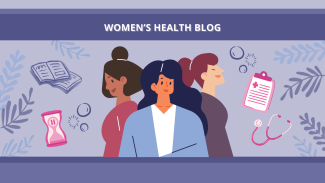Author: Shayda Swann | Editors: Romina Garcia de leon (Blog Co-coordinator) and Katherine Moore (Director of Operations)
Published: April 4, 2024
On International Women’s Day (March 8th 2024), the Women’s Health Research Institute hosted the 9th annual Women’s Health Research Symposium, titled Midlife Women’s Health Research: Unpacking the Science of the Menopause Journey and its Health Impacts. In this blog, we’ll be highlighting the work shared by the keynote speaker, Dr. Susan Reed (MD, MPH).
Why menopause matters
Perhaps the most obvious reason why menopause matters is because half of the world’s population will experience it. This ubiquitous experience brings bothersome symptoms that can reduce women’s quality of life, lead to work absences, and reduce overall productivity. Despite this, only a fraction of health funding goes towards menopause research. For instance, of the ~9,000 grants funded by the Canadian Institutes of Health Research from 2009-2020, only 5.9% evaluated female specific outcomes, let alone menopause-focused work. We encourage readers to review our three-part menopause series where we cover many of these topics in depth (Part 1, Part 2, and Part 3).
Reviewing landmark studies in menopause research
The Study of Women’s Health Across the Nation (SWAN) began in 1994 and was a US-based cohort of 3,000 women aged 42-52. They identified that “menopause transition symptoms”, such as menstrual irregularity and vasomotor symptoms (i.e., hot flushes and night sweats) peaked between ages 46-56 and that most people experience menopausal symptoms for up to 10 years. They also reported that symptoms were typically most bothersome in the two years before and after the final menstrual period. Additionally, the SWAN study identified important predictors of vasomotor symptoms, such as adiposity (body fat), having less than a college education, stress, depression, and anxiety. The SWAN study also reported key findings around sleep, mood, cognition, cardiovascular disease, metabolic health, bone health, and sexual health. For instance, they found that low libido was associated with vasomotor symptoms and that bone loss is most rapid in the year preceding the final menstrual period.
Another study, called MsFLASH, further advanced our understanding of this important phase in women’s lives, with a focus on alleviating menopause symptoms. First, they found that selective serotonin reuptake inhibitors (SSRIs) and serotonin-norepinephrin reuptake inhibitors (SNRIs) have a modest benefit of reducing vasomotor symptoms in women who cannot or prefer not to take hormonal therapies. Unfortunately, exercise, omega-3s, and yoga were not found to be beneficial therapies. Similarly, they found that neither vaginal estrogen nor vaginal moisturizer decreased the number of moderate-to-severe vulvovaginal discomfort episodes compared to placebo.
What do we know about treating menopause?
From the studies cited above and others, Dr. Reed shared the current evidence for menopause treatment options. This is a very brief overview and we encourage all women to discuss specific treatment approaches with a trusted health care provider. First, menopause hormone therapy can be initiated in most women with symptoms between ages 50-59 who are 1) low risk for cardiovascular disease, breast cancer, or venothromboembolism (blood clots) or 2) moderate risk based on informed decision-making. Treatments should be initiated within 10 years of the final menstrual period or before age 60.
Knowledge translation
Dr. Reed also shared several useful patient-centred resources to help women navigate the menopause transition. For instance, the Menopause Priority Setting Partnership has a survey where women can share their priorities for future menopause research projects. The MsFLASH study also developed a fantastic website which includes a primer on menopause, an overview of treatment options, and a tool to build a personalized “menoplan”.
Thanks to the organizers of the Women’s Health Research Symposium for another excellent meeting and for prioritizing mid-life women’s health!
